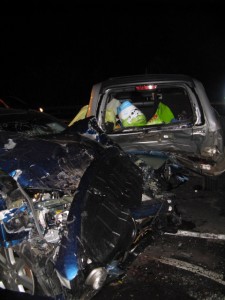ABI Opposes Bill to Lower Legal Limit to .05 in Hawaiʻi, Other States
This week, the American Beverage Institute announced its opposition to the recent swath of state bills to lower the legal blood-alcohol content limit while driving from .08 to .05.
So far this year, Hawaiʻi, Utah and Washington have proposed .05 legislation.

Puukolii traffic accident, January 9, 2013. Courtesy photo.
ABI calls out these proposals as misguided and ineffective because of their negligible impact on drunk driving fatalities and major impact on criminalizing responsible drinking.
The bills include:
•Hawaiʻi S.B. 18 – Relating to the use of intoxicants while operating a motor vehicle. Sponsored by Sen. Josh Green (D-HI).
•Utah H.B. 155 – Driving under the influence and public safety. Sponsored by Rep. Norman Thurston (R-UT).
•Washington H.B. 1874 – Addressing the blood and breath alcohol concentration of persons operating or in physical control of a vehicle, vessel, or aircraft. Sponsored by Rep. John Lovick (D-WA).
ABI points out that while these bills are a well-intentioned attempt to reduce traffic deaths, they fail to target the dangerous drivers who pose the greatest threat to traffic safety.
According to the most recent government data, roughly 70% of alcohol-related traffic fatalities are caused by drivers with BACs of 0.15 or above. And the average BAC of a drunk driver involved in a fatal crash is 0.19 — more than twice the legal limit.
ABI says that to truly protect drivers, state lawmakers should direct resources to keep these hardcore offenders off the road, including focusing on efforts to better enforce the current legal limit of .08 and ensure that high-BAC and repeat offenders are complying with laws to install ignition interlocks on their cars.
ABI also highlights how .05 legislation targets responsible drinkers. Legislation that lowers the legal limit from .08 to .05 targets those who pose little-to-no threat to highway safety. A 120-pound woman could reach a BAC of .05 with little more than a single drink and a 150-pound man could cross the threshold after just two beers.
Of the 35,000 U.S. traffic fatalities in 2015, only about 1% were caused by drivers with BACs within the disputed interval of .05 and .08. Even Mothers Against Drunk Driving has declined to endorse efforts to lower the legal limit.
ABI Managing Director Sarah Longwell published recent op-eds in the Salt Lake Tribune and the Hawaiʻi Star-Advertiser explaining why reducing the BAC limit to .05 is the wrong approach to fighting drunk driving. Ms. Longwell will also be testifying against lowering the legal limit to .05 in front of the Washington House Transportation Committee on Tuesday.
“We all want to save lives on our roadways, but lowering the legal limit won’t reduce alcohol-related traffic fatalities,” said Sarah Longwell, Managing Director of the American Beverage Institute. “Instead, the move would target responsible and moderate social drinkers while ignoring the hardcore drunk drivers who pose the greatest threat to safety—many of them registering at double or triple the current legal BAC limit. If we want to save lives we have to focus on the real problem and not be distracted by feel-good legislation that criminalizes perfectly responsible behavior.”









